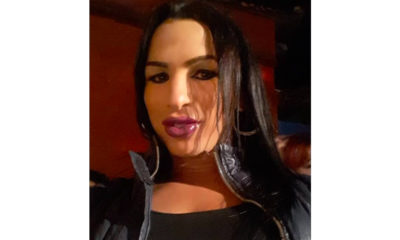News
La iglesia en Cuba donde Dios ama a los gais
Iglesia de la Comunidad Metropolitana acepta a personas LGBTI
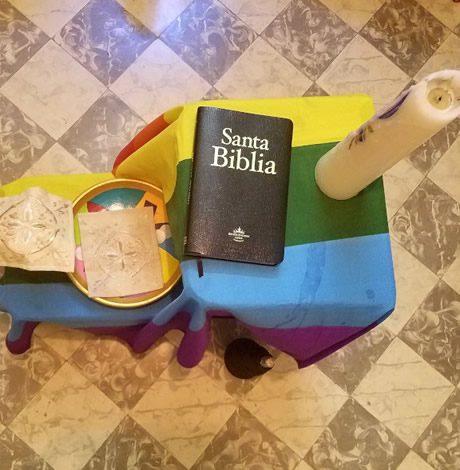
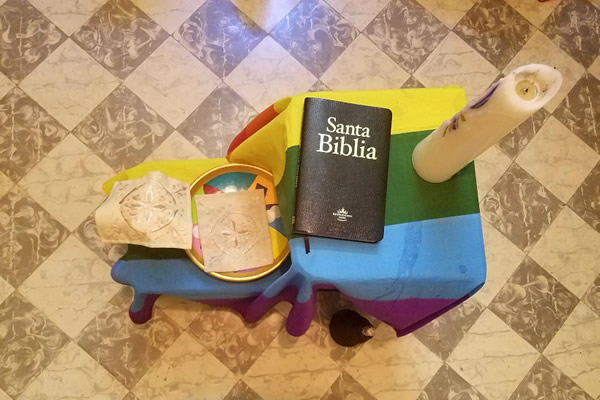
La Iglesia de la Comunidad Metropolitana en Cuba apoya a miembros de la comunidad LGBTI. (Foto de Claudia Padrón/Tremenda Nota)
Esa nota salió originalmente en el sitio web de Tremenda Nota.
LA HABANA — Son las seis de la tarde del lunes dos de septiembre del año dieciocho. Al interior de un pequeño departamento del Vedado, la pastora Elaine Saralegui oficia el culto de una denominación cristiana que acepta a las personas no heteronormativas, a las poliamorosas, a las que creen en otros dioses.
La sala de la casa no es demasiado grande. Aun así caben 12 personas repartidas entre dos butacones y las sillas plásticas que se amontonan en una esquina. Frente a los asientos se levanta un espejo de casi dos metros que refleja la cruz colgada en la pared del frente. Al centro, un cirio y una Biblia, el pan y el vino de la comunión, reposan sobre una pequeña mesa cubierta con la bandera arcoíris.
Algunos fuman y esperan con calma a que comience el culto; otros conversan apasionadamente sobre las reuniones de barrio para discutir el Proyecto de Constitución. Miguel Ángel ― un mulato delgado que usa ropa deportiva ― inició el debate diciendo que “los derechos no se plebiscitan.”
Aunque el país sea tan homofóbico como presenta la cobertura de la televisión, él, un hombre unido con otro hombre, “debería tener los mismos derechos patrimoniales y reproductivos que los demás.”
Justo al frente de Miguel Ángel, una mujer lesbiana ― Niurka ― se pregunta si en Cuba serán mayoría quienes no aceptan el matrimonio igualitario. A su lado, Ana ― madre de una niña de 5 años y pareja de un hombre trans ― no tiene dudas de que “es así.”
Elaine enciende el cirio y da play a una canción cristiana que ocupa la atmósfera de la pequeña sala desde una laptop. Es la señal, el debate debe ser pausado para comenzar el culto. Todas las personas se aproximan y forman un círculo alrededor de la Biblia. Cierran los ojos y ruegan a Dios en una oración que evoca a Cristo junto a deidades yorubas.
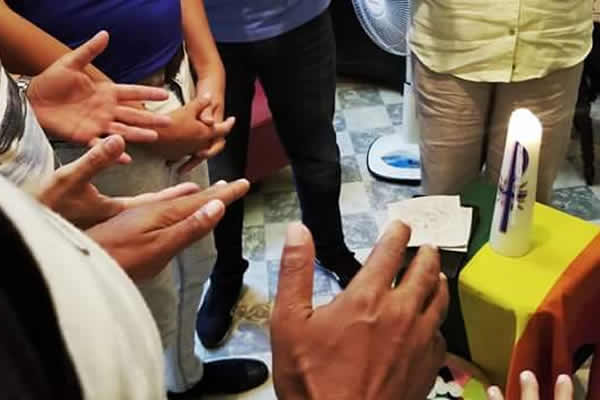
Miembros de la Iglesia de la Comunidad Metropolitana en Cuba oran (Foto tomada de la página de Facebook de “Somos ICM en Cuba.”)
Otros grupos de cristianos tradicionales tienen muchas “razones” para criticar a la Iglesia de la Comunidad Metropolitana: ICM acepta a miembros con sexualidades no heteronormativas — desde lesbianas hasta personas queer ―, ordena pastores trans, promueve el activismo LGBTI+, y no condena las religiones afrocubanas.
“Dios tiene muchos nombres y se presenta de innumerables formas,” explicará más tarde Elaine.
En 2012, al interior de la Primera Iglesia Bautista de Matanzas surgió el grupo “Somos” apara apoyar a las personas gais, lesbianas y bisexuales que asistían al templo. El proyecto sobrevivía con discreción, desde el anonimato: salvo el pastor y unos pocos miembros de la congregación, la mayoría de las personas ignoraban su existencia o misión.
Poco a poco fueron sumándose otros creyentes de distintas comunidades de fe hasta que el grupo se convirtió en una especie de refugio para las personas que habían sido excluidas o marginadas por su condición de no heterosexuales.
Tres años después de la creación de “Somos” viajó a la Isla Troy Perry, el obispo fundador de ICM, y reconoció en el proyecto cubano los mismos principios que profesaba su denominación. En ese viaje, el reverendo Perry propuso que Cuba tuviera su propia Iglesia Metropolitana. Así, el 20 de agosto de 2015 nace “Somos ICM” en la ciudad de Matanzas con Elaine Saralegui, una lesbiana, como su pastora.
La primera — y hasta ahora única — pastora de ICM en Cuba tiene 41 años. Luce el cabello oscuro en un corte conocido como garzón; tiene el ichtus — la silueta de un pez usada como símbolo por los primeros cristianos — tatuado en la muñeca derecha. Una cruz de plata le pende del cuello.
Elaine nunca ha ocultado su orientación teológica liberal. Unos años atrás, con su tesis de licenciatura aseguró que las iglesias podían ser más inclusivas hacia la diversidad sexual.
Ahora, con su ejercicio de maestría, llega más lejos: aborda la Teoría Queer ―base de la Teología Queer, en la cual se sustenta ICM ―, que enfatiza que el género, las orientaciones e identidades sexuales no son una verdad biológica, sino el resultado de una construcción social.
Desde que se graduó del Seminario Evangélico de Matanzas, las actitudes desprejuiciadas de Elaine han escandalizado a los cristianos fundamentalistas. La pastora ha sido noticia por bendecir la unión entre personas homosexuales, oficializar la boda simbólica de dos jóvenes mujeres, y participar en las jornadas contra la homofobia y la transfobia junto al Centro Nacional de Educación Sexual (Cenesex).
ICM ha recibido la anuencia del Cenesex para expandirse y darse a conocer en Cuba. La propia Mariela Castro ha apoyado públicamente a la congregación desde sus inicios e, incluso, ha asistido a varias ceremonias religiosas. Aunque no se conozca que la hija del expresidente Raúl Castro profese ninguna fe religiosa, en mayo pasado acompañó a Elaine en una ceremonia de bendición a familias cubanas y parejas homosexuales.
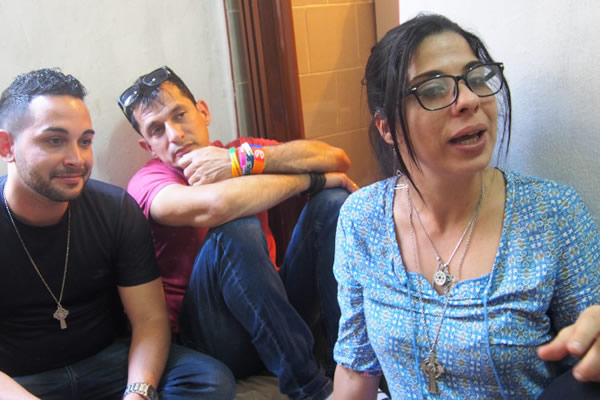
La Iglesia de la Comunidad Metropolitana en Cuba, fundada en Matanzas en 2015, ha logrado extenderse a La Habana y Santa Clara. En la imagen, Elaine Saralegui se prepara para oficiar un culto en Santa Clara. (Foto cortesía de Maykel González Vivero/Tremenda Nota)
Argelia, una transformista encargada de coordinar la Red de Mujeres Lesbianas y Bisexuales de Cuba, lee un versículo que habla del amor por encima de miedos y rechazos. Una hora antes, Argelia había llegado al apartamento número 20 junto a su novia. Es una de las primeras veces que está en el culto.
Cinco días después ambas se irán al festival de música electrónica en el Castillo del Morro como activistas por los derechos de la población LGTBI+. El grupo de ICM en La Habana es un colectivo esencialmente militante.
“En nuestras comunidades de fe trabajamos el activismo desde el respeto al otro y el debate,” explica Elaine mientras fuma un cigarro después del culto. “No respondemos con violencia, no aspiramos a imponer nuestros códigos espirituales o sexuales a los demás, pero sí defendemos nuestro derecho a vivir con dignidad.”
La comunidad metropolitana fue la única denominación religiosa que respondió públicamente a la carta firmada por cinco iglesias protestantes cubanas en contra del matrimonio igualitario, en junio de 2018.
En ese momento ICM dijo: “A nuestros hermanas, hermanos con identidades sexuales y de género no heteronormativas, gays, lesbianas, bisexuales, transgéneros, transexuales, queer, a las personas heterosexuales que defienden estas causas, a las familias diversas, a quienes han perdido la fe por causa de teologías medievales, queremos decirles: ¡Dios existe y les ama! Es poliamoroso y radicalmente inclusivo.”
A esta congregación han llegado personas que no conocían la palabra de Cristo, como Argelia o su pareja. A lado de ellas también hay protestantes de tradición que encontraron por primera vez un espacio donde no son rechazados.
Algunos de las personas que hoy asisten a ICM, antes de conocer la Iglesia Metropolitana, tuvieron que dar testimonio de su “pecado” frente a una congregación radical. En muchos casos fueron sometidos a un rito de exorcismo hasta que pudieran asegurar que Dios los había “curado,” que ya no eran homosexuales.
Si no existiera ICM, Argelia y Ana y Miguel Ángel y Niurka e incluso Elaine no serían aceptados plenamente por otra iglesia cubana. Ninguna de las cinco denominaciones cristianas opuestas al matrimonio igualitario y a la ideología de género les hubiera permitido comulgar sin aludir al “pecado.” Ni la Iglesia Católica hubiera bendecido sus uniones.
Cada lunes, el culto termina con la comunión, sobre las siete de la noche. Las 12 personas que hay en el salón se abrazan mientras escuchan a su pastora. Elaine parte la hostia para colocarla sobre la lengua de una mujer mayor que se adelanta.
Marisabel, la primera persona que recibió hoy “el cuerpo y la sangre de Cristo” es maestra de niños, presbiteriana de formación y madre de un joven rechazado por su antigua denominación. “Vengo aquí porque recibo un mensaje de amor hacia mi familia — dice —. Yo tengo un hijo gay y estoy orgullosa de cómo es.”
“Mi labor como pastora de esta denominación — explica Elaine — es sensibilizar a la comunidad en general con las problemáticas LGTBI+ y también mostrar que se puede ser inclusivo, y no por ello dejar de ser Iglesia.”
District of Columbia
Dr. Fauci receives Harvey Milk Award, reflects on legacy of love and public health
The legendary public health leader was honored by a D.C. LGBTQ synagogue for his lifetime of compassionate service and advocacy.
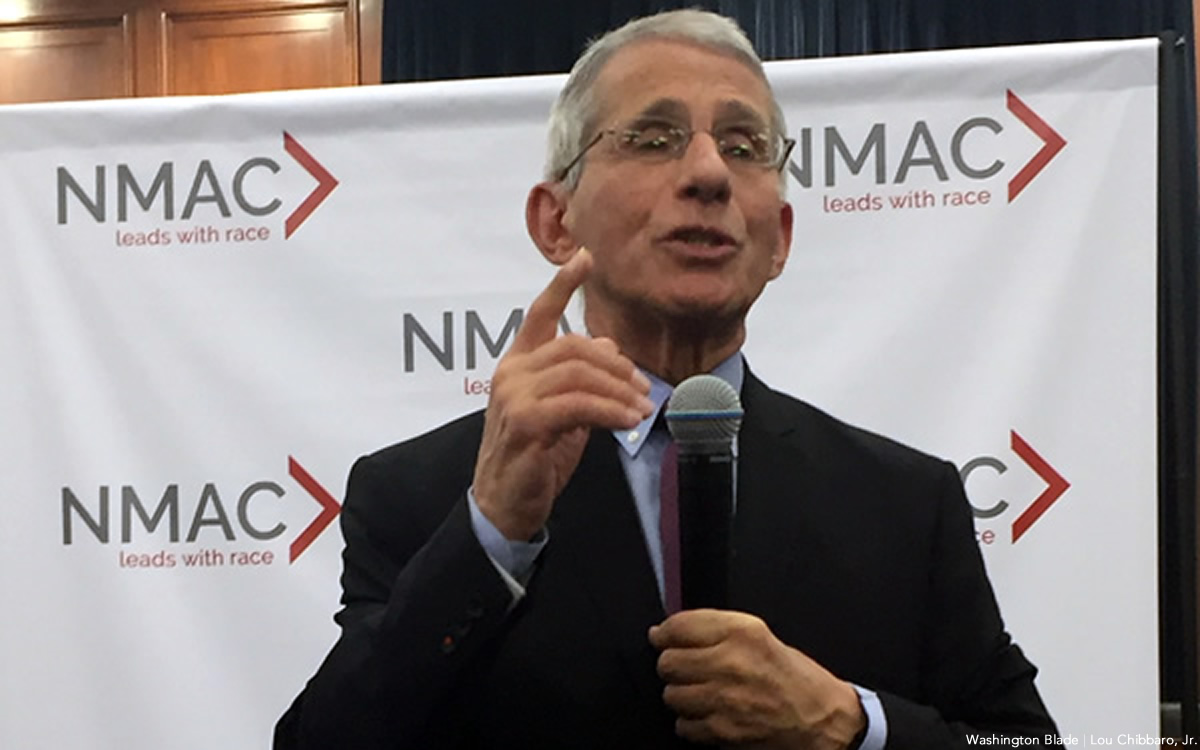
A buzz of anticipation filled Cafritz Hall on Wednesday evening. Though a few seats remained empty, the atmosphere suggested a pop star might be moments from taking the stage. But the spotlight wasn’t reserved for a chart-topping performer—it was focused on a different kind of icon.
Dr. Anthony Fauci, the former director of the National Institute of Allergy and Infectious Diseases (NIAID), stepped forward to receive the Harvey Milk Chesed Award—an honor recognizing compassion, courage, and a lifetime of public service.
The Harvey Milk Chesed Award was established by Bet Mishpachah in 1998 in honor of civil rights leader Harvey Milk. Milk, a member of the San Francisco Board of Supervisors and one of the first openly gay elected officials in the United States, was assassinated in 1978 following his public advocacy for LGBTQ rights. Bet Mishpachah gives out the award annually to an individual who has made “outstanding contributions to the LGBTQ+ and Jewish communities that exemplify the virtue of chesed, or ‘lovingkindness.’”
The program began promptly at 7 p.m. at Bet Mishpachah, Washington’s LGBTQ egalitarian synagogue, and featured a diverse lineup of speakers, including rabbis, physicians, professors, synagogue members, and past recipients of the Harvey Milk Chesed Award. While each speaker highlighted different facets of Dr. Fauci’s career – from his leadership during public health crises to his engagement with Jewish and LGBTQ communities- a unifying theme emerged: his unwavering commitment to doing what’s right, even in the face of political opposition, including from presidents.
Fauci, who was director of the NIAID from 1984 to 2022, was at the forefront of understanding and combating some of the deadliest diseases known to humanity, including tuberculosis, Zika, and HIV/AIDS. As the HIV/AIDS epidemic escalated and frustration with federal inaction mounted, Fauci took an unconventional step for a high-ranking public health official: He began engaging directly with the activists demanding change. That simple act of listening, he later explained, shaped his understanding of what patients truly needed — even when it meant defying the prevailing wisdom of the medical establishment.
“I developed long-term friendships with the activists,” Fauci said in a 2023 interview with PBS’ American Masters. “We were sort of like soldiers in the same war.”
This spirit of solidarity echoed throughout the night’s speakers, beginning with Barry Friedman, who delivered welcoming remarks to the crowd. Friedman began his introduction with a Hebrew phrase that, at first glance, might not seem to align with a man devoted to the rigor of medical science. But as he explained, it was a phrase Fauci exemplified.
“Lo tukhal l’hitaleim,” Friedman read from his notes, explaining that this message was hailed in his youth as the “11th commandment” by his mother. “You must not remain indifferent,” he translated.
Fauci, Friedman explained, remained steadfast in the principles of medicine while also showing deep compassion for those living with HIV and AIDS. He advocated for changes to drug trial protocols—convincing researchers to allow patients to “parallel track” experimental treatments, even when doing so went against past medical norms. This shift helped extend lives and alleviate symptoms in those most affected by the disease.
As the night continued, speaker after speaker reflected on the extraordinary achievements Fauci helped bring about—not just through scientific breakthroughs, but by listening to the people who were so often ignored. Fauci credited activists like Larry Kramer for ensuring the needs of HIV/AIDS patients could not be overlooked.
One of those speakers, Jeff Levi, an emeritus professor at the Milken Institute School of Public Health at George Washington University, former deputy director of the White House Office of National AIDS Policy, and a close friend of Fauci, led a panel discussion where the two expanded on stories from Fauci’s 2024 bestselling book “On Call: A Doctor’s Journey in Public Service.” During the panel, Fauci reflected on how his Jesuit Catholic upbringing helped shape a moral compass that transcended religious, cultural, and political boundaries in his public health work, and how he was able to navigate such a difficult time in medical history.
While it’s nearly impossible to calculate how many lives Fauci has helped save, the numbers point to an extraordinary legacy. Millions of LGBTQ people owe their survival in part to his efforts to understand how HIV spread, how it progressed, and how its symptoms could be mitigated. In addition, more than 25 million people worldwide- mostly in sub-Saharan Africa- have benefited from PEPFAR, the President’s Emergency Plan for AIDS Relief, which Fauci played a key role in creating.
Following the panel, Fauci took questions from the audience, reflecting on both his legacy and the enduring power of public advocacy.
“The gay community wasn’t afraid to speak up in the 1980s,” he told one audience member, who asked about the parallels between HIV/AIDS and the COVID-19 pandemic, and what people could do now to offset some of the… less than factual ‘information’ being presented as truth from the Trump administration. “And we can’t be afraid to speak up now.”
When asked what message he hopes young LGBTQ doctors will take from his life’s work, Fauci paused, then offered a heartfelt answer. “I don’t want to sound too melodramatic, but we need to love each other.”
As the crowd filtered out of the hall and only a handful of Fauci admirers lingered in line for a signed book, the Blade caught up with the evening’s honoree. Asked how it felt to receive the Harvey Milk Chesed Award, Fauci’s response was characteristically humble.
“It was a terrific honor to be given an award by this community,” he said with a warm smile—an understated close to an evening that celebrated a lifetime of extraordinary impact.
Local
Comings & Goings
SC Nealy joins Equality Arlington board; Lee Ann Wilkinson Group scores another #1 ranking
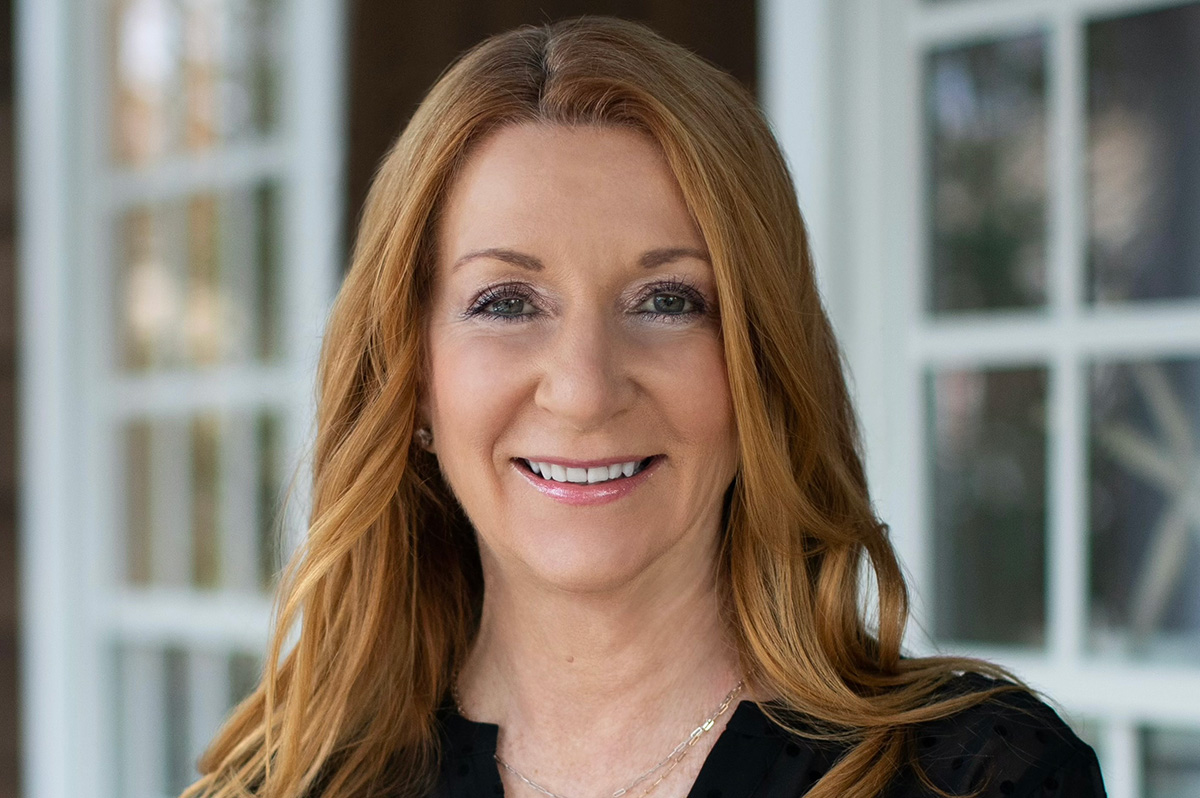
The Comings & Goings column is about sharing the professional successes of our community. We want to recognize those landing new jobs, new clients for their business, joining boards of organizations and other achievements. Please share your successes with us at [email protected].
The Comings & Goings column also invites LGBTQ college students to share their successes with us. If you have been elected to a student government position, gotten an exciting internship, or are graduating and beginning your career with a great job, let us know so we can share your success.
Congratulations to The Lee Ann Wilkinson Group, which retained its #1 ranking in sales production at Berkshire Hathaway HomeServices Worldwide, for the second consecutive year.
“Last year when we achieved #1, I was truly shocked,” said Lee Ann Wilkinson. “I never thought our little piece of paradise here in southern Delaware could compete with the larger states and more expensive markets. Achieving this level of recognition on an international scale for a second year is surreal. I couldn’t be prouder of my dedicated team, whose hard work and commitment to exceptional service make achievements like this possible. We are fortunate to do what we love, and to see our efforts recognized at this level is an honor. It’s amazing to reflect on four decades of serving our clients, whose loyalty and support have made this journey so special.”
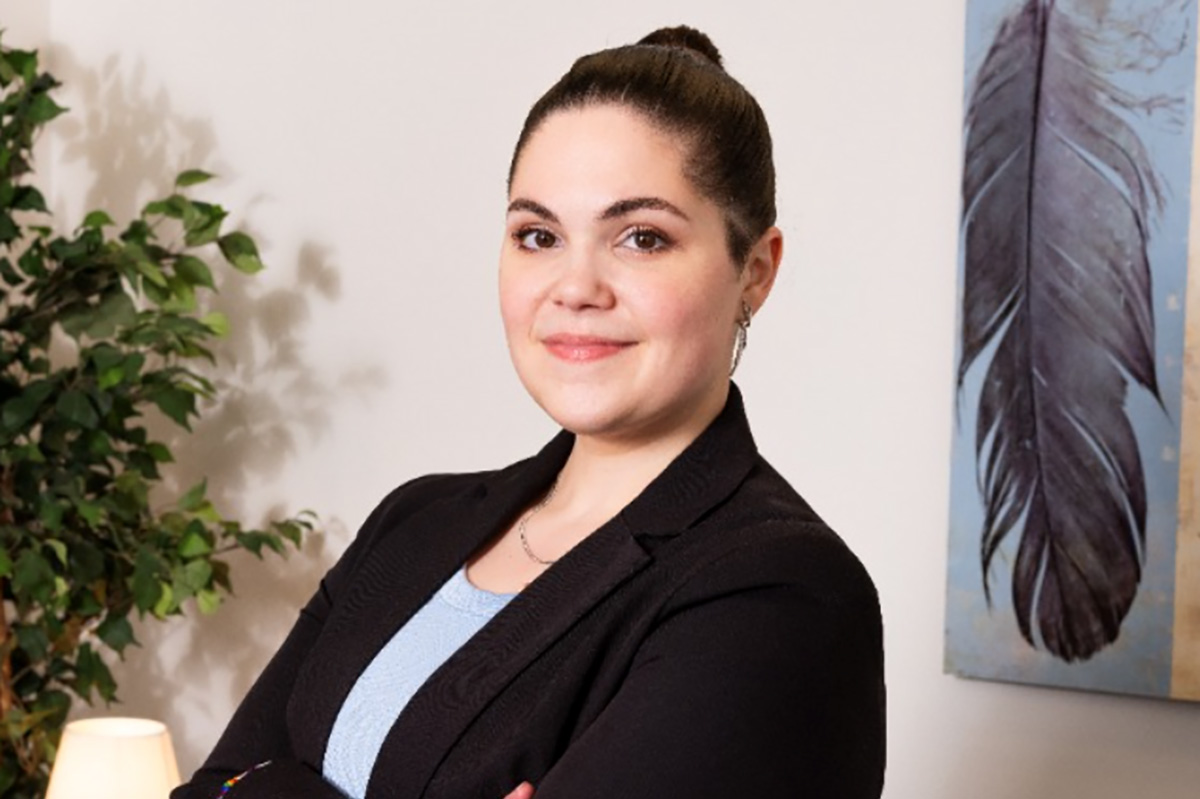
Congratulations also to SC Nealy, LPC, on becoming a new board member of Equality Arlington. Nealy said, “I have always been passionate about creating more accessible and queer celebratory mental health care for the LGBTQIA2S+ community in the DMV area, and I’m excited to work with Equality Arlington to keep working toward that goal and many others for our community here.”
Nealy has more than 15 years in the mental health field. They are a queer, gender fluid psychotherapist, clinical supervisor, and group practice owner in Arlington, Va. Nealy operates a team of all gay and trans-identifying therapists with the focus of bringing clinicians with lived experiences to the queer community and their families. They also work locally and nationally to advocate for queer rights, accessible mental health care, and bringing more awareness to the needs of the queer community. Their upcoming book published by Bloomsbury Academics, “Healing Sacred Wounds,” focuses on providing a guide map for processing and exploring their experiences in religious or spiritual trauma. As a therapist, Nealy specializes in religious trauma, female and genderfluid-identifying couples counseling, mixed orientation marriages, complex-PTSD, Borderline Personality Disorder, interpersonal process group therapy, and non-faith based premarital counseling. In their personal life, they are a parent to two children, happily partnered, and write romance novels for fun. Nealy received the 2024 Humanitarian and Caring Person of the Year Award, Virginia Counselors Association.
Nealy earned a bachelor’s degree with honors in psychology from Marymount University, a master’s in clinical and mental health counseling from Marymount; and a master’s in forensic psychology, also from Marymount.
District of Columbia
Mayor joins ribbon-cutting for opening of D.C. LGBTQ seniors home
Mary’s House for Older Adults operates facility for 15 senior
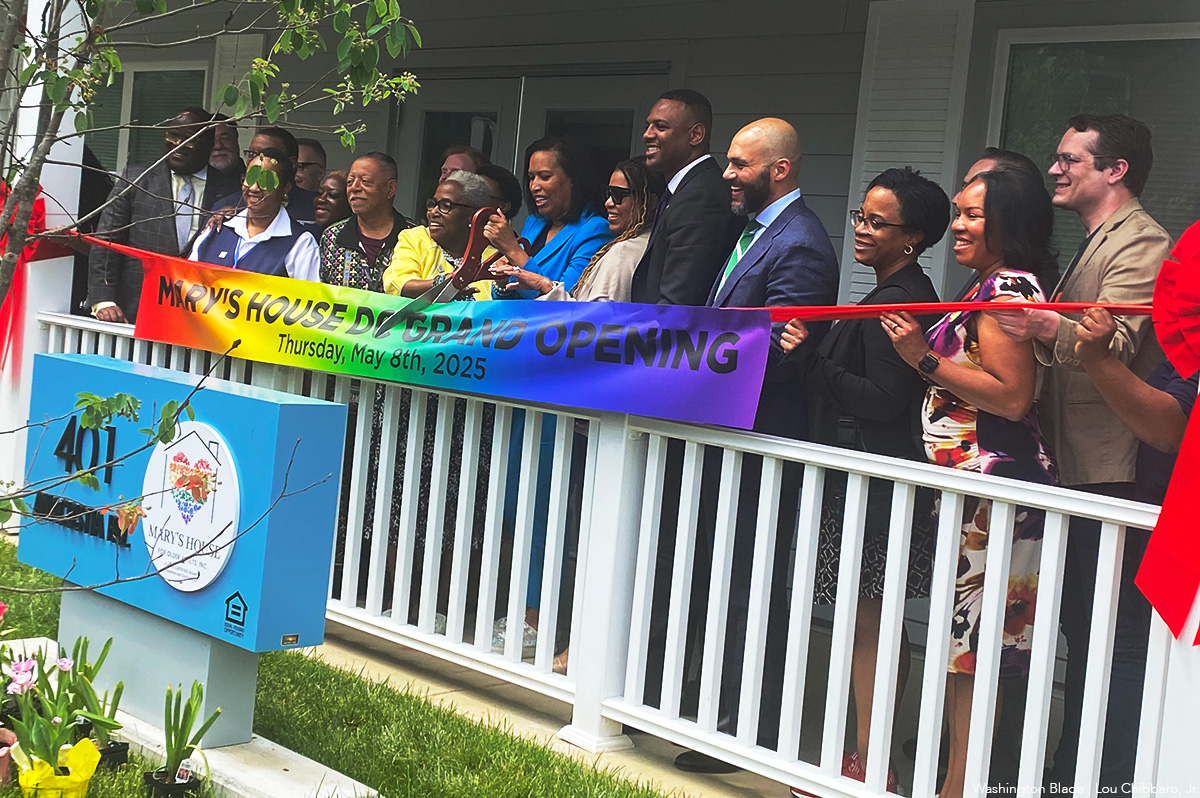
Close to 100 people joined D.C. Mayor Muriel Bowser, two members of the D.C. Council, and other city officials for a ribbon-cutting ceremony marking the official opening of Mary’s House for Older Adults, the city’s first home dedicated to LGBTQ seniors.
Located at 401 Anacostia Rd., S.E. in the city’s Fort Dupont neighborhood, the three-story house includes 15 single-occupancy residential units and more than 5,000 square feet of communal living space.
Imani Woody, the Mary’s House President, CEO, and founder, said construction of the new house, which is located on the site of the house she grew up in, was completed in January and residents began moving in in March. She said there is now a waiting list for those interested in living there.
Bowser and Woody were among nine city officials and community leaders who spoke at the event in a large outdoor courtyard behind the house that’s part of Mary’s House grounds.
“You are providing housing,” Bowser told Woody in her remarks at the event. “You are providing a solution to the epidemic of loneliness. You are providing a vehicle for Washingtonians to stay in Washington,” the mayor said. “And you are showing that a woman with an idea who cannot be stopped can deliver for D.C.”
Bowser called Mary’s House a model for senior housing that she said could be brought to other parts of the city.
Woody thanked the mayor and the D.C. Council for providing city funding to support Mary’s House.
“This house is amazing,” she told the gathering. “It houses 15 people. But the concept is more than 15 people,” she said. “This is a place for residents of Washington, D.C., LGBTQ+ same-gender-loving to have a safe space.”
Among the others participating in the event were Japer Bowles, director of the Mayor’s Office of LGBTQ Affairs, and D.C. Council members Robert White (D-At-Large) and Wendell Felder (D-Ward 7).
Felder, who noted that Mary’s House is located in Ward 7, which he represents, called the ward a “welcoming community” that absolutely has welcomed Mary’s House.
“Mary’s House represents more than just bricks and mortar,” he told the gathering. “It’s a testament to what we can achieve when we commit to justice, inclusion and community. It recognizes that our elders, especially those in the LGBTQ+ and same-gender-loving communities, in a diverse space that honors their full identity and provides not only shelter but affirmation and belonging.”
Woody said each of the 15 individual units or suites at Mary’s House includes a sleeping area, living room, bathroom, and kitchenette with a sink, microwave and refrigerator but no stove. The Mary’s House website says the shared communal areas of the house include a “fully equipped kitchen, separate dining area and living room.”
It says the communal area also includes a computer room, arts and crafts room, an exercise room, laundry facilities, community meeting space, a “tranquil quiet room for relaxation,” and an outdoor terrace with seating.
Woody points out that Mary’s House, which is a nonprofit operation, is not an assisted living facility.
The website statement adds, “Through health and wellness programs, connections to community services, and advocacy efforts, Mary’s House for Older Adults endeavors to ensure that all elders, regardless of identity, can enjoy fulfilling and secure lives in their golden years.”
Further information about Mary’s House, including the availability of space to live, can be obtained at MarysHouseDC.org or at 240-972-2500.
-
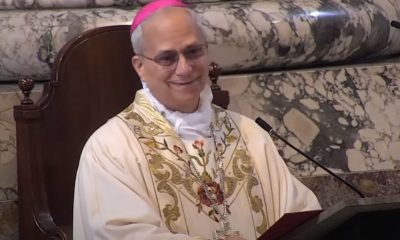
 The Vatican2 days ago
The Vatican2 days agoAmerican cardinal chosen as next pope
-
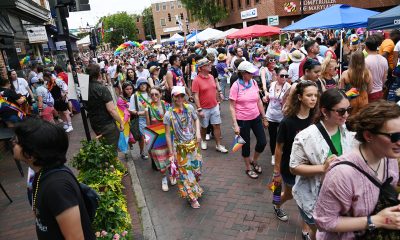
 a&e features3 days ago
a&e features3 days agoYour guide to the many Pride celebrations in D.C. region
-

 U.S. Supreme Court4 days ago
U.S. Supreme Court4 days agoSupreme Court allows Trump admin to enforce trans military ban
-
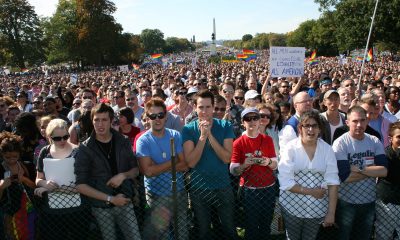
 District of Columbia4 days ago
District of Columbia4 days agoWorldPride permits for National Mall have yet to be approved



